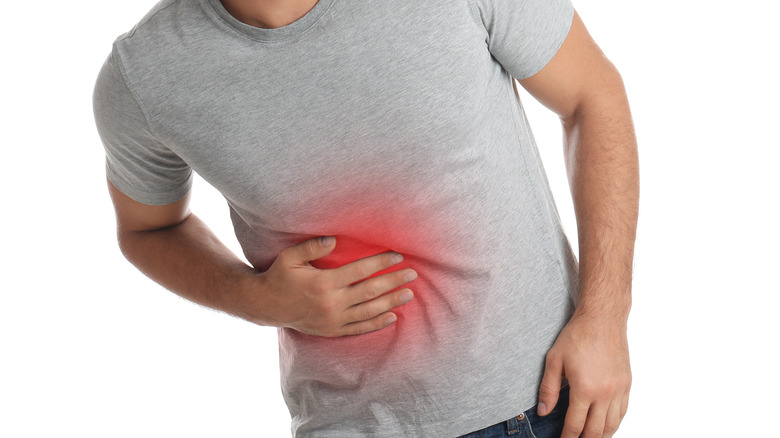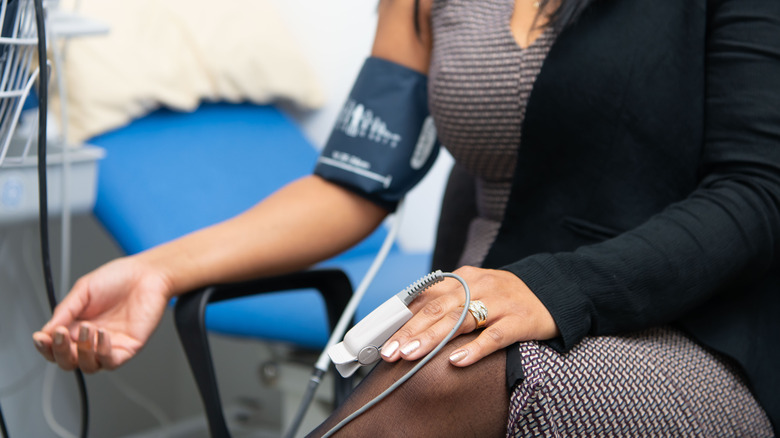What Taking Acetaminophen Every Day Really Does To Your Body
Acetaminophen, better known as the active ingredient in Tylenol, has become many people's chosen remedy to help ward off headaches or relieve pain. While it can help control pain and reduce fever, it does not reduce inflammation like a nonsteroidal anti-inflammatory (NSAID) drug would — think Advil or Motrin (via GoodRx). These medications can be harder on your stomach, which is why many opt to reach for acetaminophen instead.
Since acetaminophen is an over-the-counter product, many people think it's harmless (via Verywell Health). Dr. Melisa Lai Becker, instructor in medicine at Harvard Medical School, told Harvard Health, "People don't realize that these doses all add up, and before you know it you've exceeded the recommended dose of acetaminophen."
Next time you have an ache or pain, think twice before you reach for a second or third dose of acetaminophen. Experts recommend no more than 4,000 milligrams per day, which is eight 500-milligram tablets. Every year, thousands of people get sick from taking too much of the painkiller, according to Dr. Becker. She advises reading the label for the recommended guidelines to ensure you're taking the right amount.
Liver damage
Acetaminophen is the most prevalent cause of acute liver failure in the United States, according to the Cleveland Clinic. In fact, a 2017 study published in the Journal of Hepatology says that acetaminophen toxicity actually accounts for 46% of all acute liver failure in the United States.
"Your liver processes acetaminophen and converts it into a different substance," Healthline put it simply. "If you take large amounts of acetaminophen, your liver produces more of that substance. And when there is too much of it, that substance can damage your liver."
Symptoms of liver damage include jaundice (yellowing of your skin), pain in the upper-right abdomen, dark-colored urine and stool, nausea or vomiting, and loss of appetite. It can also lead to complications beyond liver damage, explains the Mayo Clinic, including infections, bleeding disorders, and excessive fluid in the brain. If you've taken too much acetaminophen and notice these symptoms, call poison control or get to the emergency room right away.
Drug interactions
Acetaminophen may interact with certain medications or supplements that you are already taking. In fact, there are quite a number of medications that can interact with acetaminophen — 105 in total, according to Drugs.com.
In particular, GoodRx does not recommend taking the following medications in conjunction with acetaminophen: Imatinib, Isoniazid, Pneumococcal 13-Valent Vaccine, Diphtheria Conjugate, and Pixantrone. Side effects can also occur when combining acetaminophen with any of the following seven medications: Acenocoumarol, Carbamazepine, Fosphenytoin, Lixisenatide, Phenytoin, Warfarin, and Zidovudine.
The painkiller is also found in over 600 combination formulas, according to ConsumerLab. Research also shows that "certain vitamins and herbs may affect how acetaminophen is metabolized in the body — increasing its potential for adverse effects or decreasing its effectiveness," per ConsumerLab. They thus suggest potentially avoiding supplements when taking the drug because of the potential for liver damage. Be sure to consult your doctor for specific recommendations.
Adding alcohol compounds risks
The next time your head is pounding from a hangover, you may want to reconsider taking acetaminophen and reach for something else in your medicine cabinet. According to the Cleveland Clinic, your body metabolizes acetaminophen in your liver and then uses glutathione (an antioxidant) to minimize any toxic substances. This also happens when you drink alcohol.
If you take too much acetaminophen and are a heavy drinker or consume more than the recommended number of drinks per day (one drink for women; two for men), you can cause significant damage to your liver. Dr. Christina Lindenmeyer told the Cleveland Clinic, "Over time, chronic, heavy alcohol intake depletes your liver of its glutathione stores, which can lead to problems when acetaminophen is added to the mix."
Even if you're not consuming a large amount of alcohol with acetaminophen or vice versa, you should still exercise caution. A 2018 study published in the Preventive Medicine Report investigated people who took acetaminophen while drinking "light-moderate amounts of alcohol," which was defined as two drinks for men and one for women. They found there was an increase in kidney dysfunction in those who both drank small amounts of alcohol and took acetaminophen.
Risky behavior
Can taking acetaminophen make you more likely to bungee jump or speak your mind at work? A 2020 study out of Ohio State University says yes. As part of the study, researchers gave participants 1,000 milligrams of acetaminophen, which is the suggested dose for a headache for an adult, according to the Mayo Clinic. The volunteers were then tasked with completing various activities. Researchers found that the drug led to people taking more risks.
Participants completed a computer simulation in which they were asked to inflate an onscreen balloon to win virtual money. They were instructed there was no limit to how big they could inflate their balloon and were told they could earn more money each time they pumped their balloon up and made it bigger. However, if the balloon popped, they would lose any money earned. Results showed that those who took acetaminophen kept on pumping up the balloon despite the higher risk of losing.
The study's co-author, Dr. Baldwin Way told ScienceDaily, "Acetaminophen seems to make people feel less negative emotion when they consider risky activities — they just don't feel as scared." He continued, saying, "The results have a variety of real-life implications." He used the example of COVID-19 and risk-taking. He explained that since the CDC recommends acetaminophen for COVID-19 symptoms, people with mild symptoms may feel at ease leaving their house to meet with others if they're taking acetaminophen.
Risks during pregnancy
Pregnant women have long relied on over-the-counter pain relievers like Tylenol because they are regarded as safe during pregnancy. As WebMD noted, "Most pregnant women can take acetaminophen if their doctor gives them the thumbs-up." However, some research shows pregnant women may put their unborn babies at risk if they take too much of the drug.
A 2019 study published in the American Journal of Epidemiology found that taking acetaminophen during pregnancy was associated with an increased risk for behavioral disorders like attention deficit hyperactivity disorder (ADHD) and autism spectrum disorder (ASD). Researchers noted that results should be interpreted with caution, however, due to the limitations to the study.
According to Harvard Health, some doctors are urging pregnant women to be cautious when taking acetaminophen. They cited "growing evidence of its potential to interfere with fetal development, possibly leaving lingering effects on the brain, reproductive and urinary systems, and genital development," explained Harvard. They also stated the risk is low, though more research was needed.
Rare but serious skin reactions
Acetaminophen can cause serious and potentially deadly skin reactions according to the Food & Drug Administration. There are three skin reactions the FDA says can cause serious consequences: acute generalized exanthematous pustulosis (AGEP), Stevens-Johnson Syndrome (SJS), and toxic epidermal necrolysis (TEN).
AGEP is the mildest skin reaction out of the three and usually appears on the skin in the form of small blisters filled with pus. It can rapidly spread across the entire body and be accompanied by a fever. However, AGEP usually resolves within two weeks of discontinuing acetaminophen. SJS and TEN are both life-threatening conditions and can lead to death. If you notice flu-like symptoms, followed by a rash or blistering of your skin, it's important to get medical attention right away. Recovery can take weeks to months and other possible complications can arise such as skin changes, scarring, blindness, or even damage to your internal organs.
It's important to note that skin reactions can occur any time the medication is taken, so even if you've been popping Tylenol every day for years, you are not out of the woods. GoodRx cautions, "If you notice a rash, blisters, or your skin turns red after taking acetaminophen (Tylenol), you should stop using it and get medical attention right away."
High blood pressure
High blood pressure (hypertension) affects nearly half of all adults — 45% to be exact — according to the Centers for Disease Control and Prevention. Having hypertension increases your risk for heart disease and stroke, which are both leading causes of death in America.
Unfortunately, research shows that acetaminophen may actually increase your risk of hypertension (via WebMD). Harvard University researcher, Dr. Gary Curhan, conducted a study to examine the long-term use of acetaminophen and other NSAIDs in women. At the start of the study, none of the 80,000 women studied had high blood pressure. However, approximately 1,600 of the women developed hypertension within eight years of the study. The study also showed that women who took NSAIDs for 22 days or more had an increased risk of 86% for developing hypertension. Those who took the same amount of acetaminophen had doubled their risk.
In an interview with WebMD about the study, lead researcher Dr. Curhan noted, "Even women who took NSAIDs or acetaminophen as infrequently as one to four days per month had an increase in risk." Experts thus suggested monitoring your blood pressure if you are going to take the medication.
Additionally, a 2022 study showed that regularly taking 4 grams of acetaminophen per day can increase systolic blood pressure in those who already have hypertension by approximately 5 mm Hg. "This increases cardiovascular risk and calls into question the safety of regular acetaminophen use in this situation," the study concluded.
Increased risk of renal cell cancer
According to a 2016 paper published in the International Journal of Studies of Cancer in Human Populations, acetaminophen may lead to cancer. The researchers explained, "Acetaminophen has several pharmacologic properties that suggest it could be carcinogenic in human beings." The paper reviewed a number of studies to see if acetaminophen use can correlate with different types of cancer. While the study found was no association between taking acetaminophen — even among those who take it for an extended duration — and most types of cancer, they did find that people who took higher-than-average doses of acetaminophen had an increased risk of renal cell cancer. Renal cell cancer (also known as kidney cancer) is a disease that is found in the tubes of the kidney (via National Cancer Institute).
Additionally, as the study noted, an association between acetaminophen use and melanoma, leukemia, and non-Hodgkin's lymphoma may exist. However, more studies are needed.
Reduced empathy
Have you ever used the phrase "I feel your pain" in an effort to connect with someone who was going through something difficult? This common expression is something many of us use when we're trying to be empathetic toward others. Interestingly, though, acetaminophen may dull the natural empathy we have for others.
A 2016 study published in the journal Social Cognitive and Affective Neuroscience wanted to test whether acetaminophen can actually reduce empathy for someone else's pain. As part of this study, researchers assigned participants to consume 1,000 milligrams of liquid acetaminophen or a placebo. After taking the medication, the participants took part in two different experiments so researchers could gauge their empathy. In the first experiment, participants were tasked with rating the pain level of a main character in eight short scenarios. The second experiment tasked contributors to work in small groups to complete a "closeness" exercise. Results for both experiments showed those who received acetaminophen were less empathetic for others. Researchers who conducted the study stated, "Our research is the first to show that the popular physical painkiller acetaminophen can reduce empathy to the pain of others."
Rebound headaches
If you regularly take acetaminophen for a headache but are still getting headaches, you may be experiencing a rebound headache. "'Rebound' headaches can happen with any of the over-the-counter pain relief pills, including acetaminophen and aspirin," according to WebMD. If you wake up and treat your headache with a pain reliever such as Tylenol and then when the pain wears off take more, you are actually making the condition worse.
But how can you know if what you're facing is really a rebound headache? The Mayo Clinic explained that medication overuse headaches occur every day, often when you wake up in the morning. They then improve when you take medication — only to return again when the drug wears off. Other signs can be difficulty concentrating, irritability, or memory problems.
The only way to get rid of a rebound headache is to restrict your usage of the medication. Your doctor can help you come up with a plan to help you wean yourself off. However, your headache may get worse before it gets better, and you may experience side effects like restlessness, insomnia, or nausea. But don't worry, because these withdrawal symptoms will only last a few days to a few weeks and usually disappear once the medication is out of your system.
Increased risk of an accidental overdose
"Acetaminophen toxicity is the second most common cause of liver transplantation worldwide and the most common cause of liver transplantation in the US," A 2021 paper published in Stat Pearls Publishing revealed. "It is responsible for 56,000 emergency department visits, 2,600 hospitalizations, and 500 deaths per year in the United States." While the over-the-counter medication can be safe when used correctly, the paper showed that 50% of these cases were due to unintentional overdoses.
The paper detailed how acetaminophen toxicity is divided into four stages. During the first stage, you may be asymptomatic. By the second stage, you may experience pain in your upper right-hand side, vomiting, and low blood pressure. During the third stage, gastrointestinal (GI) symptoms, liver dysfunction, renal failure, and death are possible. The fourth stage, or recovery stage, can last days to weeks. If you experience any symptoms such as cramps, fatigue, loss of appetite, or nausea and think it's from acetaminophen, call poison control right away.
You can reach poison control online at Poisoncontrol.org or by calling 1-800-222-1222.












